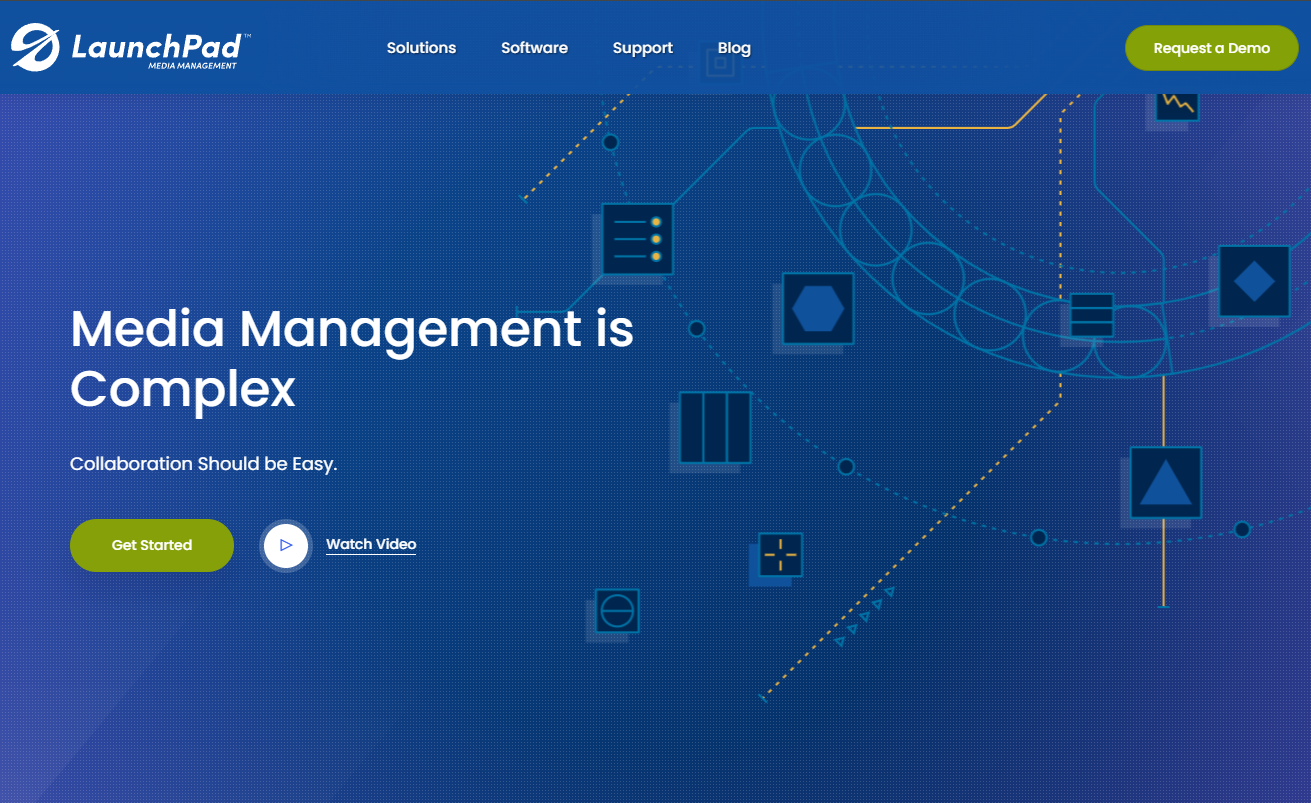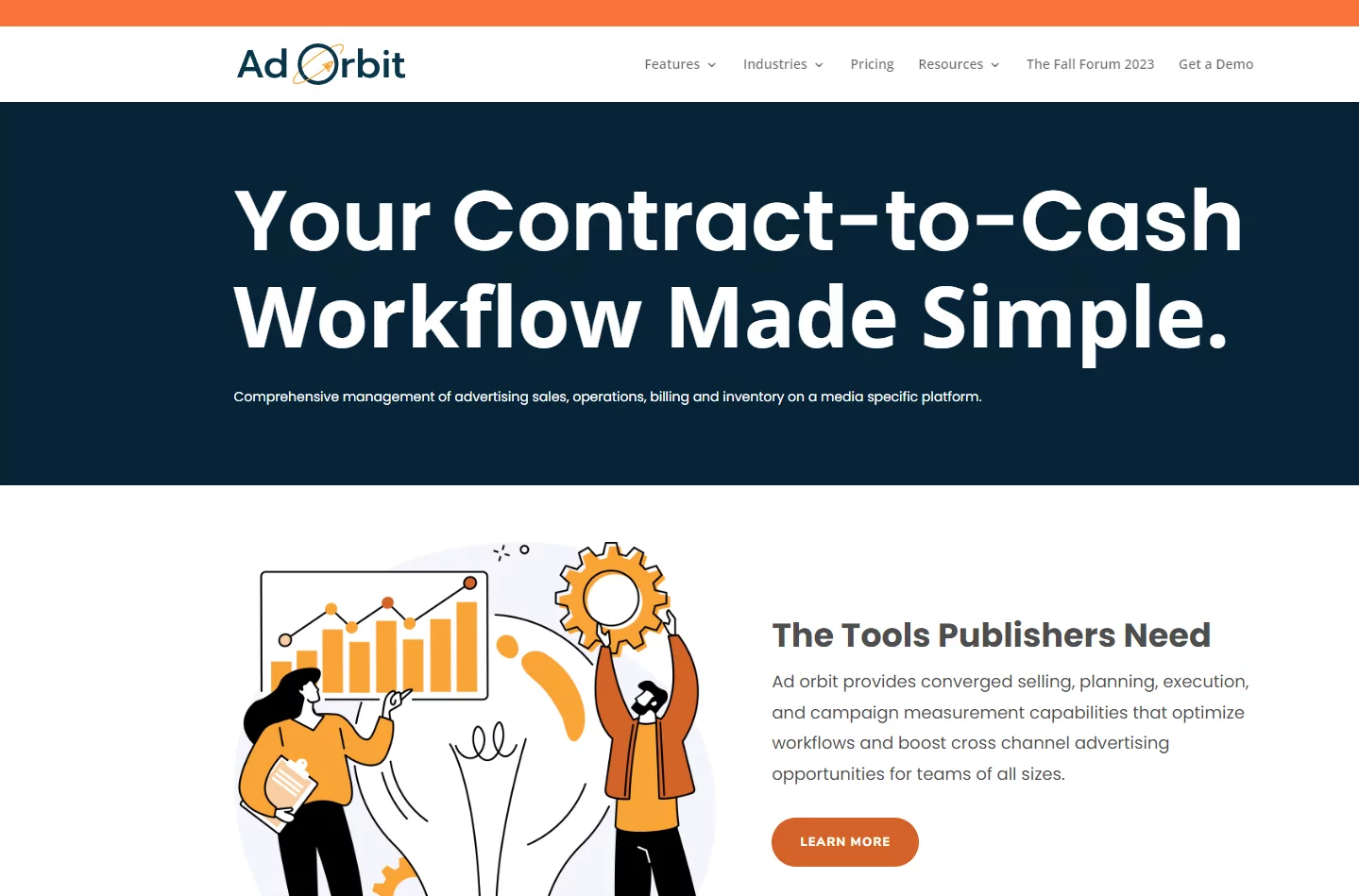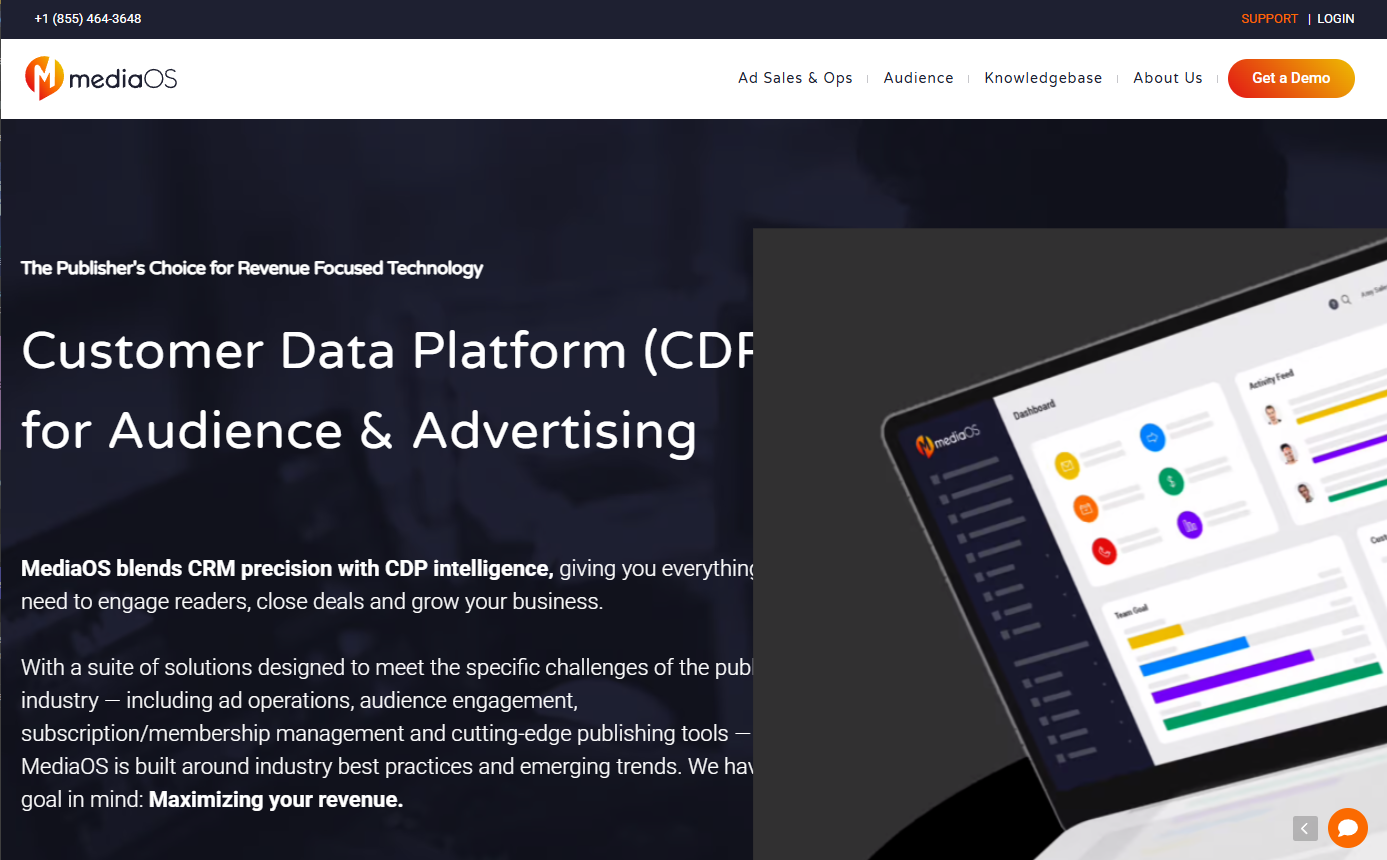Digital Platforms & Tools
Publisher growth tactics for election season | WEBINAR
Publisher growth tactics for election season | WEBINAR
Home ▸ Digital Platforms & Tools ▸ 9 Best CRM Solutions for Publishers in 2026
Top Picks
Disclaimer: Our top picks are based on our editors’ independent research, analysis, and/or hands-on testing. Editorial policy
Subscribe to Pubtech Insights

Founder at SODP
Digital publishers are in a fight for survival, striving to capture audience share from established rivals while fending off challenges from new entrants to fuel their business growth . It’s more important than ever before that publishers cultivate their audience relationships if they hope to drive revenue and maximize engagement.
Audience churn is a real problem for publishers, with some research finding that the media and entertainment industry’s average customer retention rate is just 25%. Little wonder then that more and more publishers are turning to customer relationship management (CRM) systems to help build and retain their audience.
CRM platforms have emerged as powerful tools that enable publishers to streamline their operations, enhance communication and improve customer relationships.
Customer relationship management (CRM) is the practice of collecting and interpreting customer data to build personalized marketing or sales campaigns and strengthen relationships between a brand/publisher and its customers/audience.
CRM systems are tools — cloud-based or on-premise — that assist brands in strengthening customer relationships.
When implemented correctly, CRM software collects data from all the company’s marketing channels and business automation tools, such as web analytics tools, social media channels, online form builders, survey tools, etc. Media publishers can later analyze the processed and organized data and use it to launch new campaigns, optimize their site content and more.
Digital publishers need CRM software to effectively manage their relationships with advertisers, subscribers and other stakeholders.
Publishers manage a vast amount of customer data, including subscriptions, ad placements and audience demographics. By using a CRM platform, publishers can effectively track customer behaviors, tailor their content offerings, and create targeted advertising campaigns.
Publishers monetize their content in different ways, including:
Whatever the monetization model, an excellent understanding of the target audience is essential to running profitably.
Compiling and analyzing audience data without a centralized solution would take a lot of manual effort if publishers didn’t use CRM systems, which can help improve customer retention . More specifically, the software allows users to:
In other words, implementing CRM for publishers is a way to save time, build lasting relationships with partners, grow the audience without much effort, and, most importantly, boost profits.
When choosing a CRM platform, publishers should consider the following factors:
Below is our list of the leading CRM solutions for publishers.
| Platform | Ease of Use | Content Mgmt | Audience Engagement | Ad & Revenue Mgmt | Analytics & Reporting | Integration | Scalability & Flexibility | Customer Support | Cost-Effectiveness | Security & Compliance | Automation | Mobile & Remote | Native Media Sales Workflow | Weighted Score | Small | Mid-Market | Enterprise | Velocity / Adaptability | Operational Load | Market Fit Score |
|---|---|---|---|---|---|---|---|---|---|---|---|---|---|---|---|---|---|---|---|---|
| HubSpot | 4.6 | 4.0 | 4.4 | 3.5 | 4.5 | 4.3 | 4.2 | 4.6 | 3.0 | 4.3 | 4.8 | 4.7 | 2.0 | 4.0 | 4.0 | 5.0 | 4.0 | 5.0 | 5.0 | 5.0 |
| Pipedrive | 4.5 | 3.6 | 3.8 | 3.2 | 3.8 | 3.9 | 3.7 | 4.5 | 4.6 | 3.7 | 3.9 | 4.7 | 2.0 | 3.7 | 5.0 | 3.0 | 1.0 | 5.0 | 5.0 | 4.9 |
| RunMags | 3.8 | 3.9 | 3.7 | 3.9 | 3.8 | 3.8 | 3.7 | 3.8 | 4.0 | 3.8 | 3.9 | 3.9 | 3.0 | 3.7 | 3.0 | 3.0 | 2.0 | 4.0 | 4.0 | 4.3 |
| Magazine Manager | 4.1 | 4.2 | 4.1 | 4.3 | 4.2 | 4.1 | 4.1 | 4.3 | 4.2 | 4.3 | 4.2 | 4.0 | 5.0 | 4.3 | 4.0 | 4.0 | 3.0 | 3.0 | 4.0 | 4.2 |
| LaunchPad Media Management | 4.2 | 4.1 | 4.1 | 4.4 | 4.1 | 4.2 | 4.1 | 4.3 | 4.1 | 4.4 | 4.2 | 4.2 | 4.0 | 4.2 | 4.0 | 4.0 | 4.0 | 3.0 | 3.0 | 3.9 |
| Ad Orbit | 3.8 | 3.9 | 3.8 | 4.7 | 4.0 | 3.9 | 3.9 | 4.2 | 3.8 | 4.3 | 3.8 | 3.9 | 5.0 | 4.1 | 3.0 | 4.0 | 4.0 | 3.0 | 3.0 | 3.9 |
| MediaOS | 4.0 | 4.1 | 4.1 | 4.2 | 4.1 | 4.1 | 4.0 | 4.2 | 3.9 | 4.1 | 4.1 | 4.1 | 4.0 | 4.1 | 3.0 | 4.0 | 4.0 | 3.0 | 3.0 | 3.8 |
| Workbooks | 3.9 | 3.8 | 3.7 | 3.8 | 3.8 | 3.9 | 3.8 | 3.9 | 3.8 | 3.8 | 3.9 | 3.9 | 3.0 | 3.8 | 3.0 | 3.0 | 2.0 | 3.0 | 3.0 | 3.7 |
| Salesforce for Media | 3.4 | 4.1 | 4.2 | 4.6 | 4.5 | 4.8 | 4.9 | 4.1 | 3.4 | 4.9 | 4.6 | 4.5 | 5.0 | 4.4 | 2.0 | 4.0 | 5.0 | 2.0 | 2.0 | 3.4 |

HubSpot is an elite, comprehensive CRM platform built specifically for inbound, content-based growth. It generated $2.63 billion in revenue in 2024 and is a popular choice for online publishers, magazine brands, and online media businesses looking to turn anonymous web traffic into a loyal, subscribed, and monetizable audience. Its greatest strength is its advanced automation capability and superior CRM flexibility, which allows publications to create high-level reader journeys without extensive coding.
While HubSpot boasts a robust, forever-free CRM core, its actual worth to publishers lies in utilizing its integrated Hubs (Marketing, Sales, CMS, Service) together. This one platform can connect content creation, lead capture, email nurturing, and revenue operations to deliver a 360-degree picture of the reader lifecycle. It’s ideal for mid-sized plus pubs that require a scalable, integrated tech stack to maximize subscription growth and audience engagement.
Our rating: ★★★★★ 5.0 stars
Features
Pros
Cons

Used by 100,000 companies across the globe, Pipedrive is a highly rated sales-centric CRM that helps teams track every step of the sales procedure and close deals efficiently through a simple pipeline view. While not natively intended for media workflow, its user friendliness and versatility make it a suitable option for mid-size and small publishers and media sales organizations that are interested in managing largely advertising and sponsorship pipelines.
Pipedrive provides a solid, clean framework for tracking deals, contacts, and communications that can be customized to fit a variety of different industries. To a media company, this means it can manage an ad sales pipeline efficiently but lacks inherent capabilities for media-oriented needs like insertion orders, ad trafficking, or content monetization.
Our rating: ★★★★⯪ 4.9 stars
Features
Pros
Cons

RunMags is both a comprehensive yet simple magazine CRM solution and magazine publishing software. Though it might not be widely recognized, it still offers high-quality features for managing online channels, including email integration.
The platform offers comprehensive subscription management tools, enabling publishers to handle various subscription models, automate renewal processes and manage subscriber data effectively. The platform also integrates with Stripe to streamline contract management and subscription billing.
RunMags also has management features to help with ad sales processes. For example, publishers can track ad placements, generate sales reports, and optimize revenue generation. They can also analyze revenue streams, campaigns, sales rep performance and other financial aspects and use dashboards and reports to optimize their business.
Our rating: ★★★★⯪ 4.3 stars
Features
Pros
Cons

The Magazine Manager is a comprehensive, web-based business management system from Mirabel Technologies, developed exclusively for publishers. Recognized as the most popular publishing management software in use by 24,000+ media products today, it’s an all-in-one platform to manage every part of the workflow, from advertising sales and production all the way through billing and analytics.
It goes beyond standard CRM and natively integrates the entire ad sales lifecycle, including proposals, insertion orders, production trafficking, and invoicing, into a single, unified system. Such deep and purpose-built functionality provides publishers with a complete operational hub to help in driving efficiency and revenue growth.
Our rating: ★★★★⯪ 4.2 stars
Features
Pros
Cons

LaunchPad Media Management is a purpose-developed media operations and CRM solution that streamlines the business of publishing. It is directly targeted at publishers’ most valuable revenue streams, providing a fully integrated suite for advertising sales, production, and billing. The solution is ideal for media companies who appreciate having a fast, easy, and effective system to handle their most valuable income streams.
The most robust feature of the platform is excellent usability and superior ad-revenue focus. LaunchPad brings the entire ad sales process, from initial proposal and insertion order through invoicing and accounts receivable, into a single, intuitive interface. This close revenue-pipeline alignment, combined with ease of use makes it an ideal choice for publishers looking to reduce administrative overhead and accelerate cash flow without the need for learning.
Our rating: ★★★⯪☆ 3.9 stars
Features
Pros
Cons

Ad Orbit, formerly known as MagHub, is a comprehensive CRM platform designed for magazine publishers, news publications, or digital publishers. It offers a wide range of CRM functionality features, including social media integration, to streamline operations and customer engagement.
Launched in 2013, Ad Orbit serves as a global platform for publishers to efficiently manage all aspects of their media enterprises and improve customer interactions. From inventory, ad sales, payment, and analytics, everything can be managed through one connected system.
At the same time, Ad Orbit also offers flexible booking software that allows users to handle various types of ads, channels, brands, sizes, discounts, positions and more. There are integrated project management tools to manage editorial workflows, collaborate with authors, and streamline content production processes. Audience segmentation features, meanwhile, allow publishers to deliver personalized content and targeted advertising campaigns.
Our rating: ★★★⯪☆ 3.9 stars
Features
Pros
Cons

MediaOS is a proprietary media CRM and business management system built specifically to address the unique requirements of contemporary publishers, streamers, and content creators. Unlike generic CRM solutions adapted for media, MediaOS is built from the ground up to control the complex operational workflows of a contemporary media business, with a highly integrated solution for managing audiences, content, and revenue.
The strength of the platform lies in its performance across key categories balanced against one another. It harmoniously integrates subscriber data with ad operations, content performance, and financial reporting to break down silos of data and present an integrated view of the business. This makes it a powerful choice for media companies seeking one source of truth to efficiently manage and scale their business.
Our rating: ★★★⯪☆ 3.8 stars
Features
Pros
Cons

Workbooks, another well-established cloud-based CRM platform, also tailors its offerings to the media sector, with features including audience analysis, payment management and event management. The platform is used by Rapid News Group and Global Water Intelligence.
The CRM solution offers subscription management capabilities, allowing publishers to handle subscriptions, automate renewal processes and track subscriber metrics. Workbooks also has lead management functionalities, allowing publishers to track leads, nurture customer relationships and convert prospects into subscribers. Unlike other competitors like Salesforce CRM, the pricing is 50 to 70% less. This is one of the reasons it is trusted by 1,400+ mid-market customers from more than 30 countries.
There are also intuitive tools for ad campaign tracking, enabling publishers to monitor the performance of their ad placements and optimize revenue.
Online publishers using Workbooks can efficiently handle tasks such as managing invoices, commissions and discounts. Additionally, the platform aids in tracking the sales cycle, from initiating conversations with advertisers to generating informative reports for partners.
Our rating: ★★★⯪☆ 3.7 stars
Features
Pros
Cons

Salesforce is a leading CRM platform, and its customer 360 cloud-based platform is designed for enterprise-level analytics & integrations. Serving 150,000+ businesses, it unifies subscriber data and ad operations with content strategy to achieve growth and long-lasting relationships with audiences.
While the core Salesforce platform is highly customizable, it directly addresses the most important challenges of the publishing industry with its adapted Media Cloud solution. Media Cloud helps media and digital publishing companies simplify monetization and growth by providing subscription management, ad sales, and content monetization in one integrated platform.
For larger magazines or online publications anticipating rapid growth and in need of deep, AI-powered analytics, Salesforce is an ideal choice owing to its comprehensive and scalable capabilities.
Our rating: ★★★⯪☆ 3.4 stars
Features
Pros
Cons
Publishers looking for a simple solution to handle audiences, manage ad space, and launch automated campaigns should consider mid-sized publisher-specific platforms that address these requirements.
However, for a more advanced solution to streamline sales and marketing campaigns and effectively manage relationships with advertisers throughout the entire process, including report generation and billing, a comprehensive CRM platform is more suitable.
The best CRM platform for online publishers depends on specific needs, budgets and scalability requirements, and should help gain actionable insights into audience behavior. To find the right platform, start by making a list of the required features and setting a monthly budget.
After that, consider exploring a few platforms that meet these criteria. Watching product demos and considering the features, pros, and cons of each platform can help in making an informed decision.
At the end of the day, a little due diligence will go a long way towards helping publishers set themselves up for success.
Related Posts